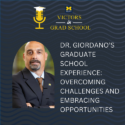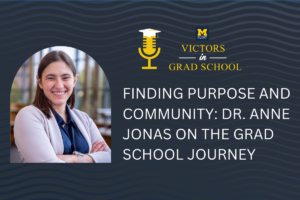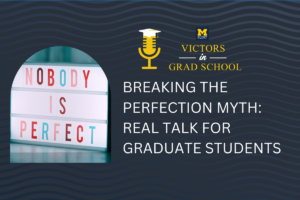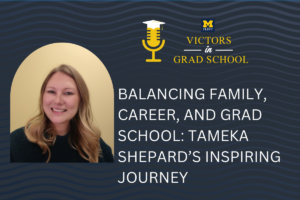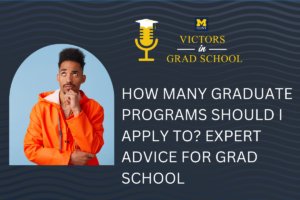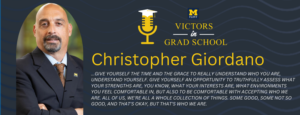
Graduate education can often feel like an uncharted territory brimming with challenges and decisions that significantly impact one’s career trajectory. In a recent episode of the Victors in Grad School podcast, Dr. Christopher Giordano, Vice Chancellor for Student Affairs at the University of Michigan – Flint, shared his multifaceted journey through various degrees, offering invaluable insights and advice for prospective and current grad students.
From English Literature to Counseling Services
Dr. Giordano’s journey began with an undergraduate degree in English Language and Literature from Rowan University. Although he cherished the skills acquired, it soon became evident that the path didn’t offer the career direction he sought. A year into a lackluster job as a copy editor, Dr. Giordano encountered an opportunity to delve into student affairs through a graduate residence director role. This serendipitous chance allowed him to pursue a Master’s degree in Counseling Services, a move influenced largely by the practical benefits of a tuition waiver. “A lot of this is exploration and discovery and kind of being open to what could be,” said Dr. Giordano, emphasizing the importance of adaptability.
The Stepping Stones: Certificates and Doctorates
Dr. Giordano’s thirst for knowledge didn’t stop at a master’s degree. His career saw him picking up a graduate certificate in Adult and Organizational Learning from Suffolk University, which he described as a crucial stepping stone that prepared him mentally and academically for the rigors of a doctoral program. His eventual Ph.D. in Higher Education from the University of Toledo proved pivotal. “Understanding the environment that we work in, the institution type, different student demographics…really taught me just kind of the world of higher ed and expanded my lens,” he noted. Each academic pursuit was a calculated move to enrich his skills, broaden his scope, and offer deeper insights into student affairs.
Balancing Commitments: Keys to Success
Dr. Giordano highlighted the importance of realistic goal-setting and time management. “You’re going to have to sacrifice something,” he noted, speaking candidly about balancing full-time work, family commitments, and academic demands. His strategy involved turning a local coffee shop into his makeshift office and using late hours in his work office to focus on his studies. Personalizing his study environments and setting strict boundaries enabled him to successfully navigate through numerous academic challenges.
Empowering Students: A Holistic Approach
Today, Dr. Giordano employs skills gleaned from his counseling background to manage both people and situations effectively. Active listening, empathy, and conflict resolution are tools he uses daily to support his team and the broader student body at the University of Michigan Flint. His biggest advice to students contemplating graduate education is to “follow your heart” and to pursue areas where they have genuine passion, reflecting his own son’s decision to switch majors to meteorology—a bold step fueled by passion despite the rigorous path ahead.
Final Thoughts
Dr. Giordano’s narrative is a testament to the nonlinear, often unpredictable paths that many take in their pursuit of higher education. His journey underscores the value of being adaptable, understanding oneself, and committing fully to one’s passions. Whether you are at the beginning of your journey or navigating through it, his insights offer a roadmap to making the most out of your graduate school experience.
For those contemplating graduate studies, Dr. Giordano’s story is a powerful reminder that the path to success is seldom straight but is always worth the journey.
TRANSCRIPT
Dr. Christopher Lewis [00:00:01]:
Welcome to the victors in grad school, where we have conversations with students, alumni, and experts about what it takes to find success in graduate school.
Dr. Christopher Lewis [00:00:11]:
Welcome back to victors in grad school. I’m your host, Dr. Christopher Lewis, director of graduate programs at the University of Michigan, Flint. Really excited to have you back again this week. And as always, every week, you and I are on a journey together. We’re on this journey of looking at grad school. You may be at the very beginning where you haven’t even applied for grad yet, but you’ve got that inkling in your mind where you’re saying to yourself, you know what? Grad school is where I am headed. And you’re just starting to look at things, or you might have already applied. Maybe you got accepted already, or maybe you’re in graduate school.
Dr. Christopher Lewis [00:00:45]:
No matter where you are, you are on a journey, and it will be continue to be a journey until you’re through that graduate school experience. And that’s what this podcast is all about. It is here to help you along this journey to give you some tools for your toolbox and to give you some ideas, some thoughts, some perspectives from other people that have gone before you that can help you to see maybe some of the roadblocks, some of the barriers, some of the things that those bumps along the way that you might not anticipate, and so that you can start planning ahead of time. That’s why every week I bring you different guests, different people with different experiences that have done this graduate school journey for themselves, and it can provide some of their own perspective. And today, we got another great guest with us today. Doctor. Christopher Giordano is with us today. And Doctor.
Dr. Christopher Lewis [00:01:34]:
Christopher Giordano is the vice chancellor for student affairs at the University of Michigan Flint. And he went on his own graduate school journey. And we’re gonna talk about that today. I’m really excited to have him here today to share that journey with you. Chris, thanks so much for being here today.
Dr. Christopher Giordano [00:01:47]:
Oh, it’s great to be here. Thanks, Chris. Happy to be here.
Dr. Christopher Lewis [00:01:49]:
Well, I’m really excited to have you here as well. And I we’re gonna go back in time. I wanna go back to those undergraduate days at Rowan University, where I know you did your undergraduate work. And, you know, you did that undergraduate work in English language and literature. But then at some point, after getting that first degree, you made a decision. You made a decision that you were gonna continue on and get a graduate degree in a different area in counseling services. So talk to me about what led you to decide initially that you wanted to move forward and move into that graduate degree?
Dr. Christopher Giordano [00:02:25]:
Absolutely. So like you mentioned, we all have our own journeys, and there are multiple kind of factors and variables that enter into how we make the decisions we do or how we end up where we do. And for me, it was sort of unique in that I had an English literature, English degree as an undergrad, which I loved, prepared me in in ways I had not anticipated. Use those skills today still, but it didn’t really provide me with a career path per se because I wasn’t interested in in teaching. I wasn’t interested in secondary ed. So I ended up, working as a copy editor at KPMG. So back in the day, there were the big six accounting firms. It was KPMG, Pete Warwick.
Dr. Christopher Giordano [00:03:19]:
Now I think there are maybe 4 or who knows with all the with all the mergers. It was a very good global organization, but the work was not really what I was looking for. And sometimes you don’t know until you do it. So I was literally editing business and consulting reports, and I would equate that to watching paint dry or watching a fan oscillate. I mean, it’s pretty dry. Know, good experience, but not necessarily what I was looking for long term. So I did that for a year. And like many other people, you graduate, you need a an income.
Dr. Christopher Giordano [00:03:53]:
So it was a steady income. But then at that point, I decided that I had some friends out in California, and we always talked about maybe living out there together, so moved out there. But I went out there during a very difficult time. It was during one of our recessions, and it was very difficult to find employment at that time. So I ended up coming back to New Jersey where I was from, and I was looking at all kinds of opportunities. And I saw this opportunity as a graduate residence director at a small private college in New Jersey, probably about 10 minutes outside of Manhattan. And I was applying to many things at the time. So I was considering graduate school, but I think this is what led me to pursue it at that time because I ended up getting that position.
Dr. Christopher Giordano [00:04:40]:
And as part of that position, I was able to go back, get my master’s for free in exchange for working in the residence halls. So that’s what got me in, and the program that seemed to fit me best was their counseling services program. So I ended up enrolling in that program. And, you know, that’s really provided me with with some, terrific, direction and skill development in ways that I hadn’t anticipated as well. So a lot of this is exploration and discovery and and kind of being open to what could be and then being flexible with how you look at the next phases of your life.
Dr. Christopher Lewis [00:05:16]:
It’s always important to look at those options. And, you know, it’s interesting because when looking at some of your backgrounds, you also got another credential as you went along. You were working at Suffolk University and you got a graduate certificate, as adult in organizational learning. And then you continued on and got your doctorate degree at the University of Toledo, not exactly at the same time that you were working at the University of Toledo. So talk to me about those additional credentials. So you went on after the master’s degree. You decided to continue learning, continuing to push yourself in different ways. What made you decide to get the graduate certificate, but then to push yourself even further to get that doctorate degree?
Dr. Christopher Giordano [00:05:54]:
Having received the the master’s in counseling at what was at the time of Uppsala College, we were required to have 2 experiential types of placements. 1 was a practicum, and 1 was an internship. So I completed a practicum in a counseling center at William Patterson University, which is a state university in New Jersey. And I completed an internship in career services at Montclair State University and another state university in Jersey. And then that really helped with my pathway into higher ed. So my first position was at Long Island University at the CW Post campus as a co op coordinator, but that sort of propelled me on on the pathway of careers in in higher ed. And in higher ed, our product is education. This is kinda what we do.
Dr. Christopher Giordano [00:06:44]:
This is what we produce in addition to all kinds of other ancillary things. But, when you’re in this this environment and in this culture, I think you continue to crave, you know, learning and more exploration, more discovery. So I had before I actually pursued that organizational learning certificate, I was working at the University of Connecticut and I enrolled in their doctoral program in human and family studies. My real path was in career in student affairs. That was my career path, but they didn’t have a a student affairs program, student affairs higher ed. So this was one that I thought was close. You know, it was at a time in my life where I didn’t have a lot of other demands on my time, and I thought it was, you know, the right time to go back. And and I took 2 or 3 classes in that program, and I just realized it wasn’t for me.
Dr. Christopher Giordano [00:07:36]:
If I was gonna dedicate the time and effort, I needed to do it in an area where I had more of a passion. So that’s what led me to, so when I took that position up in Boston at Suffolk, they had an organizational learning certificate, which at the time was meant to help get me back into the mind space of pursuing a a doctoral degree. So, you know, when you’re out of it for a while, you forget what it’s like to be a student. You forget what it’s like to be kind of in that space and the type of discipline and focus and sacrifice it takes to hold a full time job and and then to go back and pursue a degree. So that was really designed just to get me kind of back into the swing of things. So I completed that, and then that I felt I was better prepared then to enter into a doctoral program. And that’s what I did at the University of Toledo.
Dr. Christopher Lewis [00:08:28]:
And talk to me a little bit about the University of Toledo. You weren’t working there, so it’s not the same perspective in regards to some of your other degrees and working for those institutions. What made you decide that the University of Toledo was the right bit for the doctorate program that you chose to attend?
Dr. Christopher Giordano [00:08:43]:
Well, I was working there for a short time, so I’ll go a little far afield here, but my wife and I met in Boston. We were at the, working at the same university in Boston. She’s originally from Toledo, born and raised. She was looking to get back there. We just had a couple kids and cost of living, close to family, all that kind of stuff. So I ended up accepting a position at the University of Toledo, and I worked there for a year. And I enrolled in their doctoral program during that 1st year. And I was only really interested in applying for positions at universities that had doctoral programs that I was interested in, and they had a higher ed doctoral program.
Dr. Christopher Giordano [00:09:19]:
So I started there, and then again, this was in, I’m gonna say 2,009, and I think that was when another big recession hit. And my position was a newly created position, so it was one of the first that was that was sort of eliminated. So I began the program, transitioned into another role at another college, but then I maintained my my enrollment in that higher ed program.
Dr. Christopher Lewis [00:09:42]:
So in all of these different degrees, going from undergrad to masters, going into the certificate, going into the doctorate, every level, there are transitions. Every student goes through them. You started off by going from high school into undergrad, undergrad into those additional degrees, and you found success in those. You got through the degrees. You kept moving forward in your career. What did you have to do to set yourself up for success in those different degrees? And what did you have to do to maintain that success throughout your graduate school experiences?
Dr. Christopher Giordano [00:10:15]:
Yeah. I would say a big part of this for me is you understanding the commitment that it’s gonna take to get through this, especially when you have all these other demands in your life. If you’re working a full time job, if you do have a family, if you have other sort of obligations and responsibilities, you’re gonna have to sacrifice something. And for me, I knew I wasn’t really willing to sacrifice the time with my kids, so it was all the other sort of leisure activities that I would normally do. And my time was really spent just focusing on classes, study time, weekends would be dedicated to study. And for me, I knew I couldn’t do it at home. There were just too many distractions at home. So I remember in Toledo, there’s this little Big B Coffee Shop, and I would take up this corner table in this big b coffee shop, and I would be there every week, every month for years, and that was sort of my my office.
Dr. Christopher Giordano [00:11:11]:
The other place I I would work, I would stay late in my office at work, and I would work there as well. I just knew that, trying to work at home was not gonna be, I think, effective for me, which is just personal. It’s, you know, it’s it’s what works best for you. So I needed to make those decisions about what I was willing to, eliminate to create additional time for me to do the things I needed to do to be successful. And and if you enter into something, you you certainly wanna set yourself up for success. And I think sometimes that’s that’s where we we fall down a little bit is not really taking into account how this is gonna affect the rest of your life, and then making those sort of intentional decisions about how you’re gonna alter that to allow yourself to be successful.
Dr. Christopher Lewis [00:11:56]:
Now you’ve had numerous degrees. They’ve been at in different types of areas. Talk to me about, as you look back at your graduate education and you look back at your career and the work that you’re doing now as a vice chancellor for student affairs at the University of Michigan Flint, how do you feel that those graduate degrees, your undergraduate degree, all of these degrees in total, have prepared you for the work that you do on a daily basis?
Dr. Christopher Giordano [00:12:21]:
I think it’s a great question. And I and I think each has served a role. As an undergraduate English major, it really teaches you how to think critically. It develops effective problem solving skills. It certainly helps with developing strong communication skills, certainly written communications. That’s a huge part of my position here constantly, you know, having to craft different communications, whether it’s it’s out to the campus, whether it’s to other constituents needing to speak in front of groups. So you have to develop, you know, the the ability to to, craft comments and be effective at public speaking. So the English degree has really helped me, I would say, throughout my career.
Dr. Christopher Giordano [00:13:05]:
And and again, in ways that I didn’t necessarily anticipate. And my my counseling degree has really helped me as as a supervisor and as as a leader. It’s really provided me, and I use these counseling skills every day. The active listening skills, you know, empathy and and conflict resolution, team building. All of these things through counseling, I really use on a daily basis because as you continue to grow in your career, and certainly along my career path, you take on more of an administrative role. And as an administrator, what you’re doing is managing people and situations. And that is the lion’s share of what you do, and you have to have sort of the emotional intelligence and the ability to manage people in effective ways and hold people accountable, but at the same time provide them with the kind of support and resources they need to be successful. So much of what I learned in counseling has really allowed me to focus in on what some of the issues are, whether it’s person centered or issue centered, and then really develop some intentional ways of meeting needs of of people or managing people in situations.
Dr. Christopher Giordano [00:14:24]:
But I remember when I was a counselor in some of these counseling sessions, you are so laser focused on not only what somebody is saying, but how they’re saying it, what their body language is, what their facial expressions are. And these are all different types of communications. So I continue to use that as I work with people and really try to necessarily what they’re truly communicating or what truly the issue is. And really try being sure that you’re you’re not solving what you think the issue is, but you’re at the heart of truly what is the issue, and then you’re you’re kind of getting at that. So counseling has certainly helped me with that. And then the doctoral degree, that’s really understanding the environment that we work in, the institution type, different student demographics, what you can know through data about your student population on the way in, so you can prepare for what some of these needs are gonna be, what some of these gap areas are, and how you continue to create the conditions and environments that allow them to be successful. And in many ways, especially at the type of institution that we work at, it’s a very targeted approach because we have such a diverse student population. So that really taught me just kind of the world of higher ed and expanded my lens, I think, and the scope of my view of what higher ed was at all the different types of institutions that we have and how to best serve students for them to be successful.
Dr. Christopher Giordano [00:15:57]:
So while I can’t claim that this was all planned because it certainly was not, it all fell into place in a way that has worked. So that’s part of the message too is sometimes things happen in ways that you hadn’t planned. And I think if you’re just open to those possibilities, you can arrive at a destination through a route that you didn’t anticipate.
Dr. Christopher Lewis [00:16:23]:
The path is not always a straight line.
Dr. Christopher Giordano [00:16:25]:
That’s for sure.
Dr. Christopher Lewis [00:16:27]:
Many times circuitous in the easy sense of the word. So as you look back at your graduate education and you think about students that you’ve interacted with over your career and you think about students that are thinking about graduate school, what are some tips that you might offer to others considering graduate education that would help them find success sooner?
Dr. Christopher Giordano [00:16:46]:
Yeah. I would say giving yourself the time and the grace to really understand who you are, understand yourself. Give yourself an opportunity to truthfully assess what your strengths are, you know, what your interests are, what environments you feel comfortable in, but also to be comfortable with accepting who we are. All of us, we’re all a whole collection of things. Some good, some not so good, and that’s okay, but that’s who we are. But give yourself an opportunity to really understand yourself. And I think that will help to eliminate some potential paths, but then open up some others that maybe we didn’t anticipate. Because we wanna again, what we try to do with all of our students is we wanna create the conditions to allow them to be successful.
Dr. Christopher Giordano [00:17:33]:
You want to enter into some areas that will amplify your strengths and will take advantage of things that you’re good at or you truly have an interest and a passion about. And, you know, that would be another piece is really trying to pursue something or an area that that you you have a passion about. Because you’re gonna come to work every day whether you like it or not, and we hope that you like it. So, you know, do something that you really have a passion about. And one example I can provide is my son. So my son just started as a freshman at Saint Louis University, got accepted into the business school. It’s a good business school. I mean, he was in pretty good shape.
Dr. Christopher Giordano [00:18:12]:
But he’s been hinting around that that’s really not what he’s interested. That’s not his passion. He has always been interested in weather, always. But I also understand that there is a lot of math and science involved with atmospheric science and meteorology or whatever it might be. And I was a little gun shy about him moving in that direction because it’s gonna be pretty rigorous. But he stuck to his guns, I give him credit, and he’s changed his major. He’s now a meteorology major, and he’s following that path. And I give him credit.
Dr. Christopher Giordano [00:18:42]:
And it’s hard sometimes when people like me as a parent are encouraging you maybe in another direction, but you gotta stick to your guns. And you know what’s best for you. And I know it’s not always easy, but follow your heart. You know what’s in there. You know what’s really gonna be best for you, and stick to your guns. And then I think you’ll be true to yourself and put yourself on the right path.
Dr. Christopher Lewis [00:19:03]:
Well, Chris, I just want to say thank you. Thank you for sharing your journey today, your advice and sharing some of the things that you’ve learned along the way, and I wish you all the best.
Dr. Christopher Giordano [00:19:11]:
Chris, thanks so much. This was a lot of fun. Really enjoyed it, and keep up the good work.
Dr. Christopher Lewis [00:19:16]:
The University of Michigan Flint has a full array of masters and doctorate programs if you are interested in continuing your education. Whether you’re looking for in person or online learning options, the University of Michigan Flint has programs that will meet your needs. For more information on any of our graduate programs, visit umflint.edu/graduateprograms to find out more. Thanks again for spending time with me as you prepare to be a victor in grad school. I look forward to speaking with you again soon as we embark together on your graduate school journey. If you have any questions or want to reach out, email me at flintgradoffice@umflint.edu.

